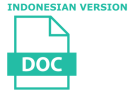Language Learning Strategy Use across Gender
Sri Wahyuni(1*)
(1) Universitas Gajayana Malang
(*) Corresponding Author
Abstract
This study examines the effects of gender on Indonesian EFL tertiary students’ use of learning strategies for speaking skills. It addresses what learning strategies the students use, what strategy and strategy group they favour, and whether gender significantly affects the strategy use. This paper reports the quantitative part of a larger mixed method study which draws on questionnaire (N= 65) obtained at Gajayana University of Malang. The study demonstrates that the students used a wide range of strategies that spread over six strategy groups. Male students favoured the strategy ‘finding out about language learning’ and the strategy group of ‘compensation’. Female students favoured the strategy ‘paying attention’ and the strategy group of ‘metacognitive’. The study also shows that gender significantly affected the use of ‘affective’ strategies only. The paper concludes by discussing implications for theory and practice.
Keywords
Full Text:
PDFReferences
Altman, H. B. (1980). Foreign language teaching: Focus in the learner. In H. B. Altman & C. V. James (Eds.), Foreign language teaching: Meeting individual needs (pp. 1–16). Oxford: Pergamon Press Ltd.
Catalán, R. M. J. (2003). Sex differences in L2 vocabulary learning strategies. International Journal of Applied Linguistics, 13(1), 54–77.
Dadour, E. S., & Robbins, J. (1996). University-level studies using strategy instruction to improve speaking ability in Egypt and Japan. In R. L. Oxford (Ed.), Language learning strategies around the world: Cross-cultural perspectives (pp. 157–166). Manoa: University of Hawaii Press.
Dreyer, C., & Oxford, R. L. (1996). Learning strategies and other predictors of ESL proficiency among Afrikaans-speakers in South Africa. In R. L. Oxford (Ed.), Language Learning Strategies Around the World: Cross-cultural Perspectives (pp. 61–74). Manoa: University of Hawaii Press.
Ehrman, M., & Oxford, R. (1990). Adult Language Learning Styles and Strategies in an Intensive Training Setting. The Modern Language Journal, 74(3), 311–327. https://doi.org/10.1111/j.1540-4781.1990.tb01069.x
Green, J. M., & Oxford, R. (1995). A Closer Look at Learning Strategies, L2 Proficiency, and Gender. TESOL Quarterly, 29(2), 261–297. Retrieved from https://doi.org/10.2307/3587625
Griffiths, C. (Ed.). (2008). Lessons from Good Language Learners. Cambridge: Cambridge University Press.
Hong-Nam, K., & Leavell, A. G. (2006). Language learning strategy use of ESL students in an intensive English learning context. System, 34(3), 399–415. https://doi.org/10.1016/j.system.2006.02.002
Kobayashi, Y. (2002). The Role of Gender in Foreign Language Learning Attitudes: Japanese female students’ attitudes towards English learning. Gender and Education, 14(2), 181–197. https://doi.org/10.1080/09540250220133021
Lan, R., & Oxford, R. L. (2003). Language learning strategy profiles of elementary school students in Taiwan. IRAL - International Review of Applied Linguistics in Language Teaching, 41(4), 339–379. https://doi.org/10.1515/iral.2003.016
Larsen-Freeman, D., & Long, M. H. (1991). An introduction to second language research. London: Longman.
Lee, K., & Oxford, R. L. (2008). Understanding EFL Learners’ Strategy Use and Strategy Awareness. Asian EFL Journal, 10(1), 7-32. https://www.asian-efl-journal.com/main-editions-new/understanding-efl-learners-strategy-use-and-strategy-awareness/index.htm
Liu, D. (2004). EFL proficiency, gender and language learning strategy use among a group of Chinese technological institute English majors. ARECLS E-Journal, 1(5). Retrieved from https://research.ncl.ac.uk/media/sites/researchwebsites/arecls/Dongyue.htm
Nguyen, N. T. (2008). Characteristics influencing language learning strategy use of English learners in ESL context. In Paper presented at the MWERA Annual Meeting. Columbus, Ohio. Retrieved from http://www.allacademic.com/meta/p273617_index.html
Oxford, R. L. (1990). Language learning strategies: What every teacher should know. New York: Newbury House.
Oxford, R., & Nyikos, M. (1989). Variables Affecting Choice of Language Learning Strategies by University Students. The Modern Language Journal, 73(3), 291–300. https://doi.org/10.1111/j.1540-4781.1989.tb06367.x
Pallant, J. (2007). SPSS survival manual: A step-by-step guide to data analysis using SPSS for windows (version 15). Crows Nest: Allen & Unwin.
Radwan, A. A. (2011). Effects of L2 proficiency and gender on choice of language learning strategies by university students majoring in English. Asian EFL Journal, 13(1), 115–163. Retrieved from https://asian-efl-journal.com/PDF/March-2011-aar.pdf
Riazi, A., & Khodadadi, F. (2007). The Effect of EFL students’ level of Proficiency and Gender on their use of speaking strategies. Teaching English Language, 1(2), 99–116. Retrieved from http://www.teljournal.org/article_113125.html
Skehan, P. (1989). Individual differences in second-language learning. London: Edward Arnold.
Wharton, G. (2000). Language Learning Strategy Use of Bilingual Foreign Language Learners in Singapore. Language Learning, 50(2), 203–243. https://doi.org/10.1111/0023-8333.00117
Article Metrics
Refbacks
- There are currently no refbacks.
Copyright (c) 2022 The Author(s)

This work is licensed under a Creative Commons Attribution-ShareAlike 4.0 International License.







